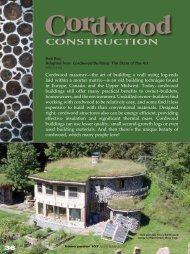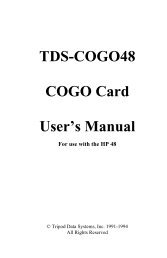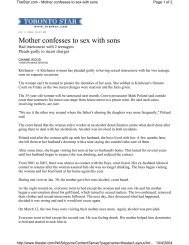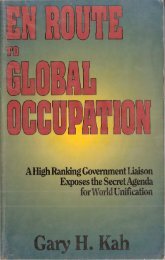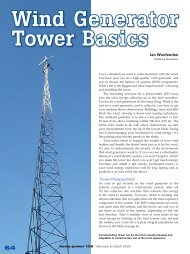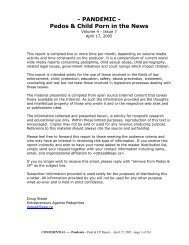G. Edward Griffin - The Fearful Master - PDF Archive
G. Edward Griffin - The Fearful Master - PDF Archive
G. Edward Griffin - The Fearful Master - PDF Archive
Create successful ePaper yourself
Turn your PDF publications into a flip-book with our unique Google optimized e-Paper software.
complains about being subject to "a jurisdiction foreign to our Constitution and<br />
unacknowledged by our laws" (supremacy of the World Court); it deplores "transporting<br />
large armies of foreign mercenaries to complete the works of death, desolation and<br />
tyranny already begun with circumstances of cruelty and perfidy scarcely paralleled in the<br />
most barbarous acres and totally unworthy of the head of a civilized nation" (Katanga).<br />
<strong>The</strong> men who put their signatures to the bottom of the Declaration of Independence were<br />
signing their own potential death warrants. Most of them were prosperous and comfortably<br />
situated with every reason to go along with the existing bureaucracy. Besides, what<br />
chance did inexperienced farmers have against the British Army, at that time the most<br />
invincible fighting force in the whole world? If the colonies had been overpowered, as it<br />
appeared more than likely they would be, these men who signed the Declaration would<br />
have all been banged or shot as traitors. Yet, without hesitation they stood up for what<br />
they believed to be right and declared: ". . . and for the support of this declaration, with a<br />
firm reliance on the protection of Divine Providence, we mutually pledge to each other our<br />
lives, our fortunes, and our sacred honor."<br />
In signing the Declaration of Independence, John Adams turned to his colleagues and<br />
spoke these words:<br />
If it be the pleasure of Heaven that my country shall require the poor<br />
offering of my life, the victim shall be ready. But while I do live, let me<br />
have a country, or at least the hope of a country-- and that a free<br />
country. But whatever may be our fate, be assured . . . this declaration<br />
will stand. It may cost treasure, and it may cost blood; but it will stand,<br />
and it will richly compensate for both. . . . And live or die, survive or<br />
perish, I am for the declaration. It is my living sentiment, and, by the<br />
blessing of God, it shall be my dying sentiment: independence now, and<br />
independence forever!<br />
Can it be that modem Americans are not equal to their ancestors? Are we not willing, if<br />
necessary, to make sacrifices in the cause of freedom? Is it more important to enjoy the<br />
temporary comforts of the "good life," the security of a non-controversial social status, than<br />
to pass on to our children the cherished liberty we ourselves inherited? As Patrick Henry<br />
would have replied, "Forbid it, Almighty God!"<br />
As you read these final words, you must come to a decision as to your own reply to these<br />
questions. Each man and woman will soon be called upon for his answer. <strong>The</strong> rapidity of<br />
world events will no longer permit us to remain aloof and unaffected by them. Disinterest<br />
will no longer purchase a ticket for escape. Tyranny demands unqualified allegiance: We<br />
are either for it or against it. <strong>The</strong>re is no middle around.<br />
Which will it be, America?<br />
NOTES<br />
1. Rev. Richard Ginder, "Key to Your House," syndicated column Right or Wrong, Our<br />
Sunday Visitor (Huntington, Ind., 1961).<br />
2. As quoted by Lie, p. 242.<br />
3. As quoted by Manly, p. 82.


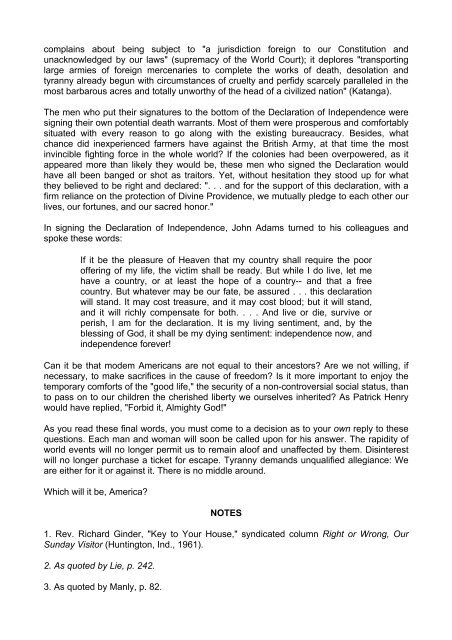
![Robert T McQuaid [rtmq@stn.net] Sent: Friday, October 29, 2004 12 ...](https://img.yumpu.com/51070071/1/190x245/robert-t-mcquaid-rtmqstnnet-sent-friday-october-29-2004-12-.jpg?quality=85)
